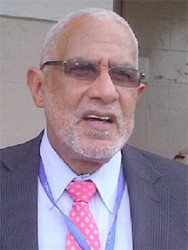Comparisons of Guyana’s parliamentary procedures with those observed in Barbados and Bermuda suggest that the Chambers of the Attorney General (AG) should not be involved with bills beyond the point of drafting, and certainly not after they have been passed in the National Assembly.
In recent months a debate on parliamentary procedure, particularly the matter of whom a bill should be sent once it is passed in the National Assembly, had been ongoing with members of government, the opposition parties – A Partnership for National Unity (APNU) and the Alliance for Change (AFC) – and several past political functionaries giving their positions on numerous occasions.
AG and Legal Affairs Minister Anil Nandlall, despite criticism, has maintained that Guyana’s Constitution imbues his office with the legitimate authority to vet bills once they have left the National Assembly, while the AFC and APNU have argued that there are no legal, constitutional or otherwise, provisions to substantiate Nandlall’s claim.

Throughout the course of 2013 several bills, having been passed in the National Assembly, were stagnated in the AG’s Chambers before being sent to the President for him to indicate his intent or the lack thereof to assent.
In the case of the four Local Government Bills passed more than two months ago, the Clerk of the National Assembly is still waiting for them to come back from the AG’s Chambers so he can send them to the President.
Amidst the reiteration of local contributors to the debate, Stabroek News sought to find out about, and compare Guyana’s parliamentary procedures to those of Barbados and Bermuda.
Speaker of the Bermuda legislature, Randy Horton when approached in this regard, explained that after bills are passed they are sent to the Governor General who, on behalf of her Majesty the Queen, determines if assent will be given.
Horton, who had been Deputy Speaker for two years before becoming Speaker this February, said Bermuda has a bicameral legislature and so bills need to be passed through the lower and upper houses before the Governor General is called in. Though the government has the majority in the lower house, it does not have this advantage in the upper house (the Senate).
The senate comprises 11 members, 5 of whom are selected by the government; 3 by the opposition leader; and the remaining 3 members are selected by the Governor General. Horton said it can be considered a good thing that the governor does not have the majority in the Senate since it is at this level of government that the bills are scrutinized.
If bills are found to be unsatisfactory, they can be sent back so that the necessary changes can be made. But, once bills are passed at both levels of the legislature they are sent directly to the Governor. Interest-ingly enough, the AG’s Chambers is involved in the drafting of bills before they are brought to the legislature.
Barbados’ procedures are similar. In an interview with Stabroek News Barbados house Speaker Michael Carrington also said that once a bill is passed, it is sent to the Governor General for assent. Like Bermuda, Barbados has a bicameral legislative system, but once a bill clears both the upper and lowers houses of the legislature, it is then sent to the Governor General for assent.

Also, as is the case in Bermuda, the AG’s Chambers is only involved in the bill’s drafting.





